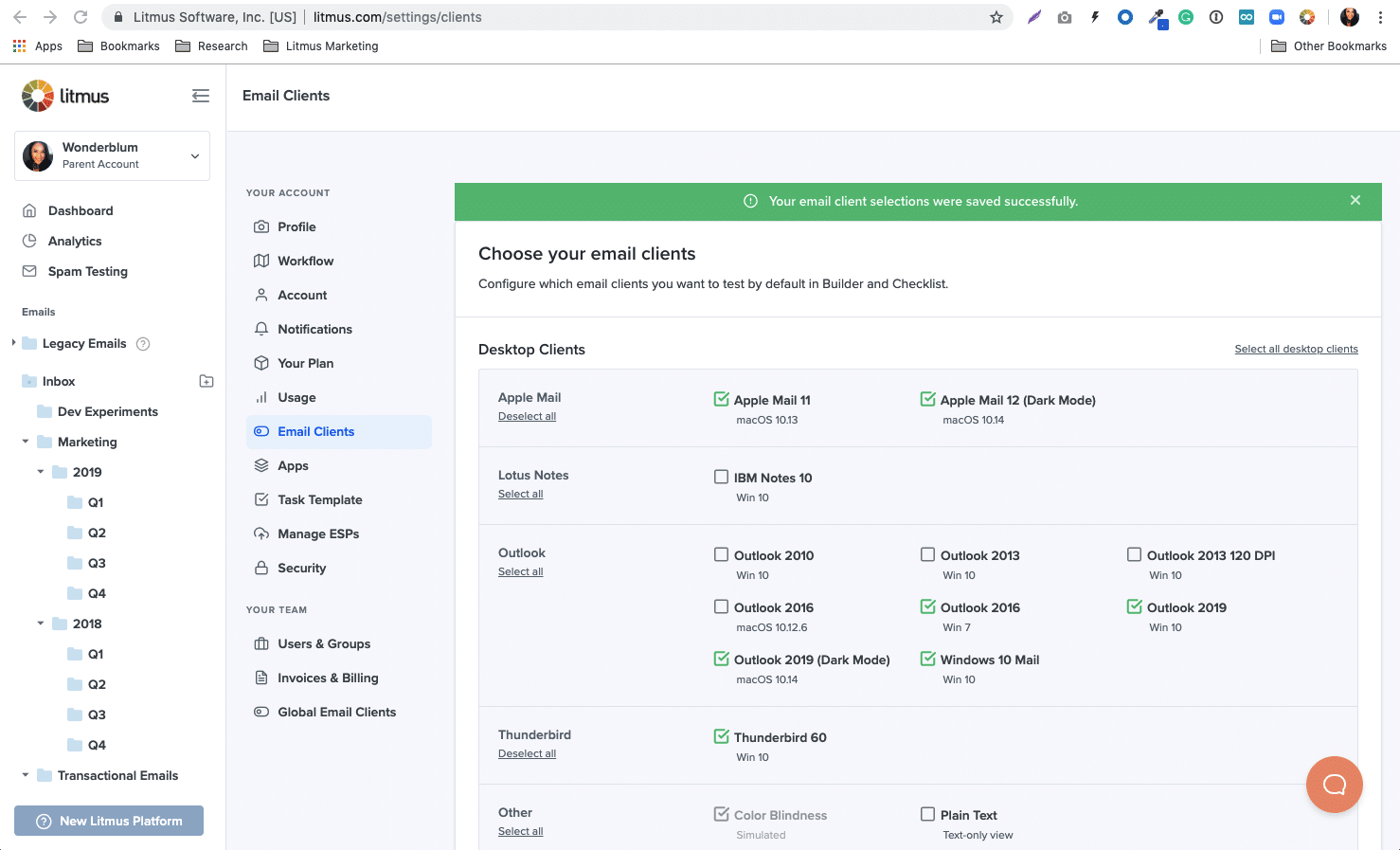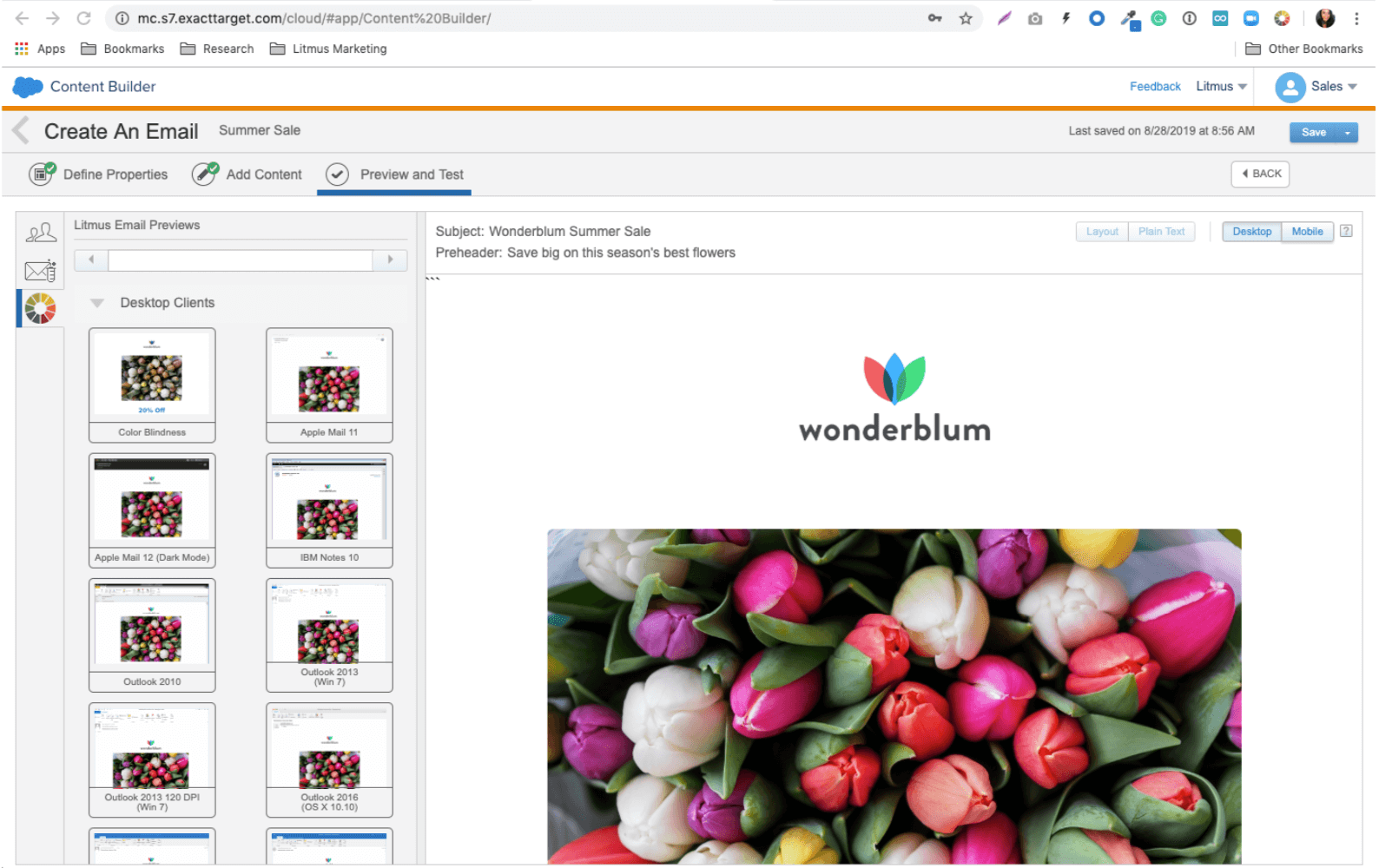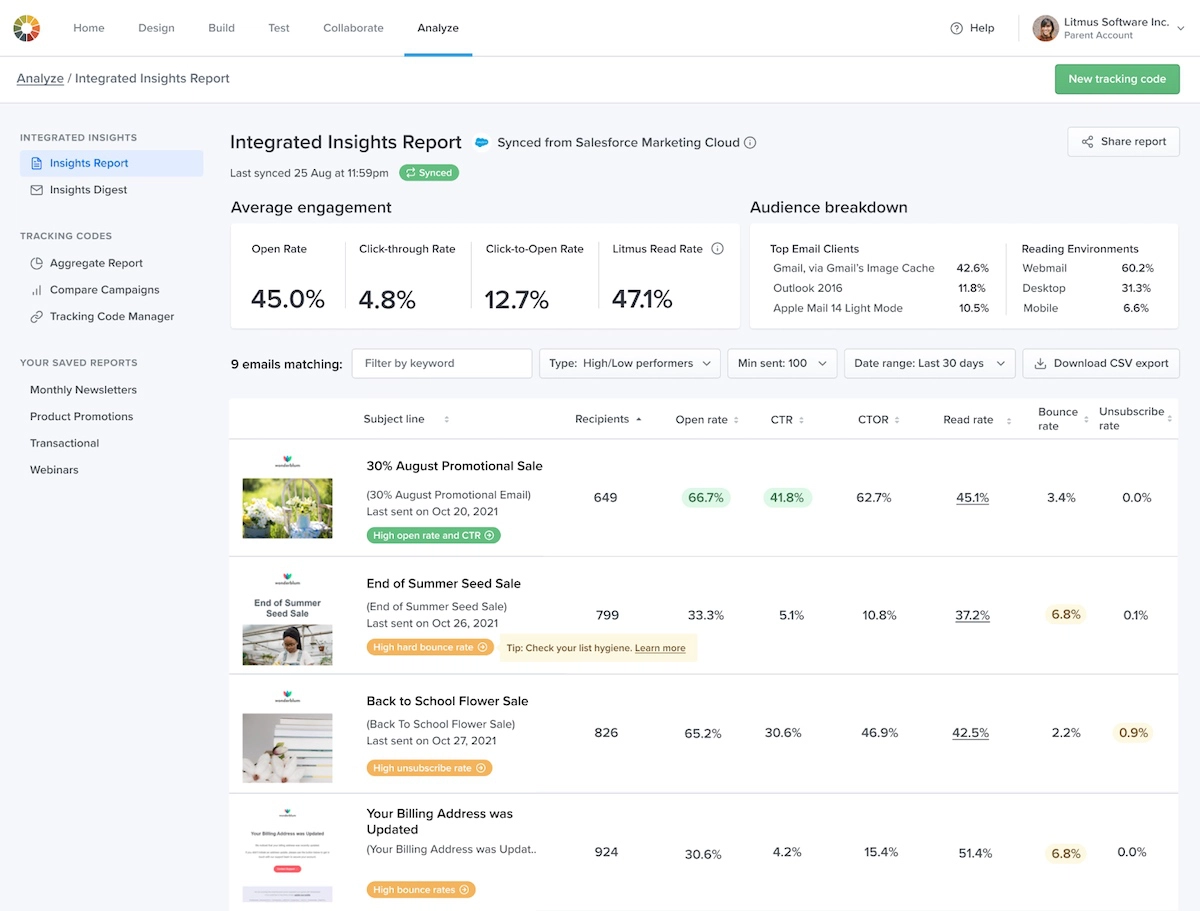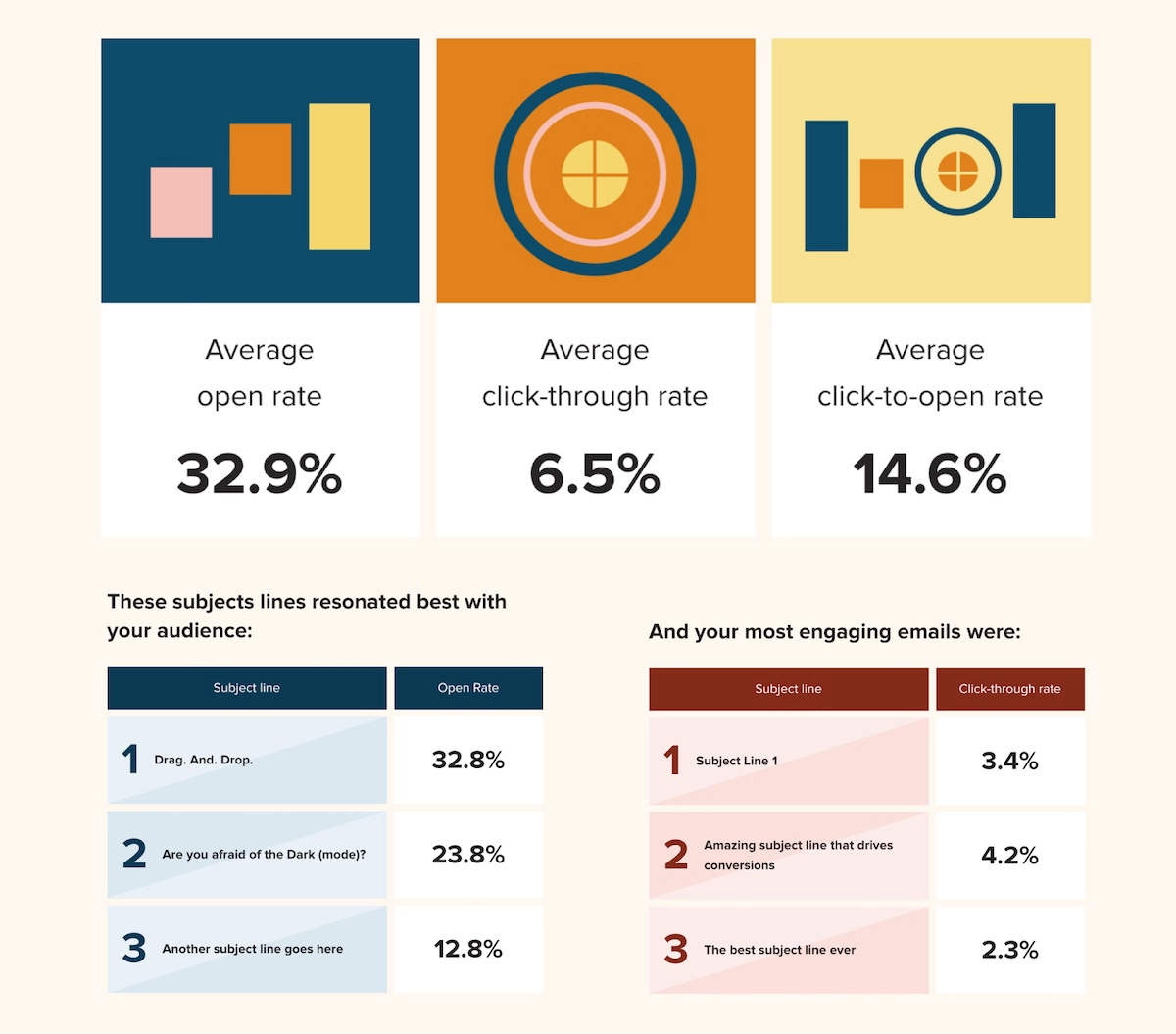Key takeaways ✨
|
It’s one of the most powerful pieces of marketing software you can purchase. Between marketing automation features, detailed marketing analytics, and so much data you can use to personalize every bit of the customer journey, you won’t go wrong with Salesforce Marketing Cloud (SFMC) as the cornerstone of your program. It can pretty much do it all…except preview and test your emails, of course. 😉
Email geeks, we always got your back. And while Salesforce Marketing Cloud (SFMC) is super powerful, we came up with a few ways to supercharge it even more for email marketers and designers. In this post, we’ll talk through exactly what kinds of integrations we offer for SFMC and how you can make the most of it for your next cross-channel campaign.
Table of contents:
- What is the Salesforce Marketing Cloud and Litmus integration?
- What are the benefits of integrating SFMC and Litmus?
- How does Litmus integrate with SFMC?
- ROI of integrating Salesforce Marketing Cloud with Litmus
- How to set up the integration between SFMC and Litmus
- Customer support and resources to help with your integration
- Maximizing your SFMC investment
- FAQs for the SFMC + Litmus integration
What are the Salesforce Marketing Cloud + Litmus integrations?
Teams who use Salesforce Marketing Cloud and Litmus can integrate them to unlock exclusive features that enable your team to build, test, and personalize emails without leaving SFMC. It cuts hours off of tedious email workflows by eliminating clunky feedback chains and gets emails to market faster.
What are the benefits of integrating SFMC and Litmus?
We’re a little biased, but we think we have the best email integrations for Salesforce. You’ve already got the benefits of a rich customer data platform and the ability to manage multiple customer journey flows. Adding Litmus on top of that? *chef’s kiss*
Exclusive features for teams with Litmus Enterprise plans
Any email team that uses Salesforce can use Litmus, but only Enterprise plans get access to the Salesforce Marketing Cloud and Litmus integrations—and the perks that come along with them.
With Litmus and Salesforce working together, you can:
Automate your email workflow for seamless collaboration
Use standardized email templates and find all of your email-related tasks in one place. No more switching from tool to tool or clumsy copy-and-pasting. Organize, build, review, test, and analyze until every email is on brand and looks great, all in one place.
Optimize your email testing and deliverability
Preview your emails in hundreds of clients and devices as you build in SFMC. Then perform a thorough pre-send spam test—as well as other critical checks—in Litmus. Or, transfer your code from Litmus to Salesforce with a single click. Any changes you make will sync automatically.
Access actionable insights and personalization
Uplevel your email marketing campaigns with deeper personalization and segmentation. Access insights on reliable opens, read rates, and more data you can’t get with SFMC alone. Litmus lets you increase conversions with every email! (Your sales team will thank you.)
Reach the inbox—not the spam folder
Make sure the email you built and tested arrives in the inbox with deliverability monitoring in Litmus Email Guardian (available with all plans). It’s the only solution that watches your emails 24/7 and alerts you to potential issues immediately, like broken links, images, and errors caused by email client changes, that could affect your user experience and deliverability.
Easily combine email QA feedback in one tool
Say goodbye to manually collecting and sorting reviewer feedback! Litmus Proof is a collaboration hub that saves your team time and keeps everyone aligned by bringing all comments, questions, and feedback into one tool.
Access advanced user permissions
Get the right people involved in the right places using subaccounts. You can assign users seven role types, and each comes with different permissions and access levels. This way, account holders can make sure users are focused on their areas with access to only the features that they need.
How does Litmus integrate with SFMC?
By combining the power of Litmus and SFMC, marketing teams can collaborate more efficiently and optimize their entire email workflow. Test emails within SFMC, sync your SFMC code as you build in Litmus Builder, and gain access to deeper, integrated subscriber and account insights.
See it in action in our interactive demo.
1. Preview and test emails directly in SFMC Email Studio and Content Builder
Users can test emails right within SFMC Email Studio and wherever Content Builder and Journey Builder are used. Our integration allows you to test individual personalization at the subscriber level with integrated email previews within SFMC.
In Email Studio, head to the Preview & Test step and select the Litmus icon. From there, you can toggle between individual subscribers to see how personalization will render at the subscriber level.
You can test dynamic content both with the in-app SFMC integration and Litmus Extension. You can even preview how your email will render across 100+ popular email clients and devices.
First, head over to your Litmus account to configure which email clients you want to test by default.

After you save your preferences there, they will be reflected in your Salesforce Marketing Cloud account under the Preview and Test screen.

With a single click, you can test each version of your email.

Within the Content Editor, you can select blocks of dynamic content or “rules” to toggle between versions within the email.
2. Test and personalize as you build with Litmus Extension
Litmus Extension is a free Chrome extension that eliminates the need to move between multiple applications so you save time in your email production workflow. With Litmus Extension, you can easily add open-time personalization elements (like engaging Countdown Timers). You can also test important details as you build, like links, tracking, image blocking, and loading speed, to make every error-free and optimized for conversions.
3. Sync your emails from Litmus to SFMC
Copying and pasting email code is time-consuming and leaves room for errors. With Litmus ESP Sync, you can say goodbye to the manual copy and pasting and keep your code up to date in your SFMC automatically as you build in Litmus Builder.
ESP Sync lets you build, review, and test emails in Litmus without having to manually transfer code and image assets between Litmus and SFMC. You can also sync to specific folders to stay organized, and also easily pull in HTML from SFMC to review in Litmus Proof, Previews & QA, or Spam Testing.
If you prefer to build within SFMC, Litmus ESP Sync lets you import your email in a single click to Litmus for collaborative reviewing and testing.
4. Get actionable, holistic insights with Litmus Integrated Insights
Litmus Integrated Insights leverage data from both SFMC and Litmus, giving you access to actionable email insights—all in one view. Quickly identify opportunities to improve results with key email performance indicators that help you keep your finger on the pulse of your email program—without manual effort or analysis.

Litmus Integrated Insights combines email performance data from SFMC as well as subscriber engagement data from Litmus. With this at-a-glance view, you can quickly identify opportunities to improve your email campaign results, without switching tools.
Additionally, get actionable subscriber insights delivered to your inbox. The Litmus Insights Digest—a weekly summary of email engagement—makes it easy to stay on top of subscriber trends and behaviors. Every week, you’ll get sent your top subject lines and the most engaging content from your email campaigns in the past week right in your inbox. Plus, get a snapshot of key email performance highlights that help keep your finger on the pulse of your email program.

Learn from the best
Your favorite brands use Litmus to deliver flawless email experiences. Discover the ROI your emails can achieve with Litmus.
ROI of integrating Salesforce Marketing Cloud with Litmus
Companies that integrate SFMC and Litmus see incredible results. Check out these examples from Emerson and DEG.
Litmus is the centralized hub for Emerson’s entire email workflow
Emerson’s Commercial and Residential Solutions business helps to ensure human comfort and health, protect food quality and safety, advance energy efficiency and environmental conservation, and more. This team builds a mix of evergreen monthly newsletters, major seasonal campaigns, and additional emails in Salesforce Marketing Cloud. In an effort to optimize their workflow, the team integrated Litmus so they could better build, test, review, and analyze emails at scale.
DEG produces the best quality work at scale with Litmus
DEG, Linked by Isobar is a full-service agency that creates and executes top-to-bottom marketing strategy for clients around the globe. In a given quarter, they send on average more than 3 billion emails through Salesforce Marketing Cloud on behalf of their clients—phew! They turned to Litmus to build, test, and deliver pixel-perfect, accurate email, faster.
Learn how others have seen success with Litmus & SFMC →
How to set up the integration between SFMC and Litmus
Getting started with Litmus and Salesforce Marketing Cloud takes a few steps, but once the connection is established, you can get started right away. Here’s how to set up the integration:
- Start in your Salesforce Marketing Cloud account. Choose your name from the top right hand screen and click Setup from the Settings menu.
- Note that your SFMC account must have the All Subscribers List setting enabled and you’ll need Administrative rights. This setting is disabled by default and can be enabled by submitting a request through SFMC support.
- Under Platform Tools > Apps, choose Installed Packages. Add a new installed package (that’s us!) by clicking New, naming it something cool like “Litmus is awesome,” and clicking Save. Then, under Components, click Add Component, select API Integration, and then Next. Select Server-to-Server as the type of integration and click Next.
- Grant permissions for email (read, write, send), documents and images (read, write), saved content (read, write), list and subscribers (read, write), and data extensions (read, write) and click Save.
- Choose Save. After, you will see the API Integration details for the Component you just created including Client ID, Client Secret, and Tenant subdomain. Keep this page open—you’ll need it for later.
- Now you can set up the Litmus side of things. In your Litmus account, go to Settings > Manage ESPs and enter the Tenant subdomain, Tenant instance, Client ID, and Client secret for the API component you created from Step 4.
For more details on ESP sync, or if you get stuck (happens to the best of us, we know!), click here for the full set of instructions.
If you want to view an SFMC campaign in your Litmus account, then once you’ve made the connection, head to the Builder tab in your Litmus account and choose Sync to ESP. You can sync to Templates or Campaigns in SFMC or to a specific folder or subfolder of your choice.
You can also import new campaigns from Litmus into SFMC. To do so, choose Create New on your Litmus home screen, and then Test or Collaborate depending on what you’d like to do. From there, click Next and choose Salesforce Marketing Cloud from the ESP dropdown.
Otherwise, you can see your testing and previews directly within Email Studio or Content Builder by going to the “Test and Preview” section for either tool within Salesforce Marketing Cloud.
Customer support and resources to help with your integration
Integrating Litmus into your existing tech stack is easy. Check out a few resources that can help smooth the transition and get you up and running quickly:
SFMC and Litmus resources
- Learn more on our integration page.
- Check out each aspect of the integration in this pre-recorded webinar.
- Read through the Salesforce documentation in our Help Center.
Ready to get started? Contact us directly here.
Unlock endless revenue
Let’s take a look at how much email-driven revenue you could be leaving on the table.
Maximizing your SFMC investment
If you want to maximize your investment in Salesforce Marketing Cloud, integrating it with Litmus’ Enterprise Plan is a must. Teams who use Enterprise save 2+ hours on their email review cycles! Companies have also seen a 68% decrease in email error rate, 53% increase in email CTR using Live polls, and a 44% increase in email sales.
Litmus makes it easier than ever to create highly effective campaigns with Salesforce Marketing Cloud. Quickly build, test, and analyze your way to higher conversions and deeper insights. See how the Litmus + Salesforce email integrations can supercharge your email marketing efforts.
FAQs for the SFMC + Litmus integration
Which features are only available on the Litmus Enterprise plan?
Upgrading to the Litmus Enterprise plan gives you access to features that help you create better emails including:
- More testing and users.
- Drag and drop building.
- Integrated Insights.
- Dedicated account management.
- Collaboration features: easy reviews and approvals, custom controls and brand settings, advanced user permissions, subaccounts, and enterprise security and SSO.
How does Litmus ensure secure integration with SFMC?
Our customers’ confidentiality, data privacy, and security is at the forefront of every decision we make. Learn about Litmus’ data privacy and security.
What features does the SFMC + Litmus integration offer?
The integration offers all of the most popular Litmus testing, building, and personalization features—and more. By implementing the SFMC + Litmus integration, you’ll gain access to easier building, more personalization features, insights from multiple sources in one place, helpful collaborations features, and more.
What insights can I gain from combining Litmus with SFMC?
You will get additional subscriber engagement insights to layer on top of those available through Salesforce. Easily view and share performance data with your team in one place with our Integrated Insights Report in Litmus Email Analytics. You can even
How does the SFMC + Litmus integration handle email collaboration?
Sync emails between Litmus and Salesforce while building so they stay up to date every time it’s saved using ESP sync. Then easily combine and review email QA feedback directly in Litmus Proof to keep everyone aligned.
Can I test dynamic content with Litmus in Salesforce Marketing Cloud?
Yes! You can preview emails and dynamic content across 100+ email clients and devices without leaving Salesforce to ensure error-free, on-brand emails.
Seamlessly connect with Salesforce Marketing Cloud
Elevate your email ROI with Litmus and Salesforce Marketing Cloud. Achieve better insights, testing, and collaboration.
Lindsey is a Sr. Content Marketing Manager at Validity.



